| dc.contributor.advisor | Saman Amarasinghe. | en_US |
| dc.contributor.author | Wong, Eric, M. Eng. Massachusetts Institute of Technology | en_US |
| dc.contributor.other | Massachusetts Institute of Technology. Department of Electrical Engineering and Computer Science. | en_US |
| dc.date.accessioned | 2014-03-06T15:48:05Z | |
| dc.date.available | 2014-03-06T15:48:05Z | |
| dc.date.copyright | 2012 | en_US |
| dc.date.issued | 2012 | en_US |
| dc.identifier.uri | http://hdl.handle.net/1721.1/85522 | |
| dc.description | Thesis: M. Eng., Massachusetts Institute of Technology, Department of Electrical Engineering and Computer Science, 2012. | en_US |
| dc.description | Cataloged from PDF version of thesis. | en_US |
| dc.description | Includes bibliographical references (pages 85-89). | en_US |
| dc.description.abstract | Multimedia applications are the most dominant workload in desktop and mobile computing. Such applications regularly process continuous sequences of data and can be naturally represented under the stream programming domain to take take advantage of domain-specific optimizations. Exploiting characteristics specific to multimedia programs can provide further significant impact on performance for this class of programs. This thesis identifies many multimedia applications that maintain induction variable state, which directly inhibits data parallelism for the program. We demonstrates it is essential to recognize and parallelize filters with induction variable state to enable scalable parallelization. We eliminate such state by introducing a new language construct that automatically returns the current iteration number of a target filter. This thesis also exploits the fact that multimedia applications are tolerant in the accuracy of the program output. We apply a memoization technique that exploits this tolerance and the repetitive nature of multimedia data. We provide a runtime system that automatically tunes the memoization capabilities for performance and output quality. These optimizations are implemented in the StreamIt programmming language. The necessity of parallelizing induction variable state and performance improvements and quality control of our memoization technique is demonstrated by a case study of the MPEG benchmark. | en_US |
| dc.description.statementofresponsibility | by Eric Wong. | en_US |
| dc.format.extent | 89 pages | en_US |
| dc.language.iso | eng | en_US |
| dc.publisher | Massachusetts Institute of Technology | en_US |
| dc.rights | M.I.T. theses are protected by copyright. They may be viewed from this source for any purpose, but reproduction or distribution in any format is prohibited without written permission. See provided URL for inquiries about permission. | en_US |
| dc.rights.uri | http://dspace.mit.edu/handle/1721.1/7582 | en_US |
| dc.subject | Electrical Engineering and Computer Science. | en_US |
| dc.title | Optimizations in stream programming for multimedia applications | en_US |
| dc.type | Thesis | en_US |
| dc.description.degree | M. Eng. | en_US |
| dc.contributor.department | Massachusetts Institute of Technology. Department of Electrical Engineering and Computer Science | |
| dc.identifier.oclc | 871039418 | en_US |
